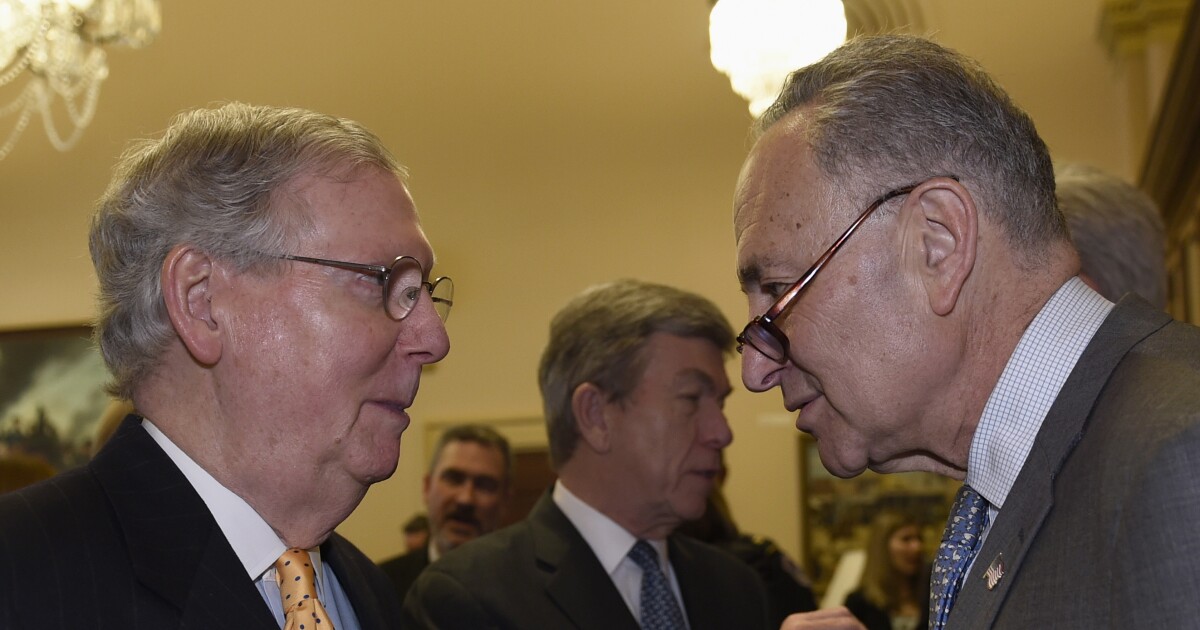

The battle for Senate control will hinge on campaigns in any one of six states, maybe seven, as Republicans aim to net the single seat they need to reclaim the majority in the midterm elections.
Democrats are defending the barest of advantages. Their rule over the evenly divided, 50-50 Senate exists courtesy of the tiebreaking vote Vice President Kamala Harris wields in her constitutionally designated role as Senate president. That leaves Democrats little room for error in a 2022 election cycle shaping up as a Republican wave and correspondingly leaves the GOP multiple options to reach 51 among the six to seven states where the parties are duking it out.
Interviews with the Washington Examiner Monday revealed extraordinary consensus regarding the Senate battlegrounds, with Democratic and Republican strategists agreeing on the states with the most competitive campaigns. They are listed here in alphabetical order, to account for the evolving nature of each contest.
What appears most competitive today, or winnable for either side of the aisle, could change at a moment’s notice, especially in the aftermath of the Supreme Court decision overturning Roe v. Wade. Unlikely to change is the defensive crouch Democrats find themselves in. The map simply offers the GOP more offensive opportunities to reach the promised land than it does for Democrats to block them from getting there.
FALL CAMPAIGN LANDSCAPE UPENDED BY SUPREME COURT ABORTION RULING REVERSING ROE
Arizona. Sen. Mark Kelly (D) vs. Republican nominee to be chosen in an Aug. 2 primary
Kelly has been busy raising truckloads of campaign cash for the fall while Republicans sort out who they want as their standard-bearer in a contentious nominating contest. Kelly had raised nearly $39 million to date for the 2022 cycle, and built a $23.3 million war chest, according to Federal Election Commission filings he submitted all the way back on March 31.
With the help Kelly is on track to receive from outside groups such as the Democratic Senatorial Campaign Committee and Senate Majority PAC, the super PAC aligned with Senate Majority Leader Chuck Schumer (D-NY), he will have more than enough resources to defend himself. The key is whether he can outperform President Joe Biden’s abysmal Arizona job approval ratings and weather a rough political climate in which Democratic voters have seemed disinterested and Republican voters are clearly jazzed to put their party back in charge of Congress.
Republican Blake Masters, a former venture capital executive, would appear to be the favorite in the Republican primary after being endorsed by former President Donald Trump. But it is far too early to rule out wealthy businessman Jim Lamon or state Attorney General Mark Brnovich. All three have the potential to cause Kelly fits — or ease his path to reelection.
Time will tell for an incumbent senator who won his seat in November 2020 in a special election to finish out the term originally won by Sen. John McCain (R), who died in office in August 2018.
Georgia. Sen. Raphael Warnock (D) vs. Republican nominee Herschel Walker
Warnock is the other Senate Democrat who advanced to the Senate in 2020 (well, a Jan. 5, 2021, runoff) in a special election, defeating the appointed Republican incumbent, Kelly Loeffler. Warnock has since established himself as a likable, hard-working senator who (also like Arizona’s Kelly) has raised an exorbitant amount of campaign cash.
With a war chest of $23 million as of May 4, Warnock could be harder to beat in (legitimate) battleground Georgia than many Republicans presume. He could also run into a Republican buzz saw. Biden’s numbers in the Peach State are atrocious. And Walker, a first-time candidate for office endorsed by Trump, is a Georgia folk hero with virtually 100% name identification and possibly just as much goodwill.
Walker, a former professional football player, led the University of Georgia Bulldogs to a national championship in the early 1980s and has remained popular in the state ever since despite living the better part of the last two decades in Texas.
Democrats see glimmers of hope here in Walker’s controversial personal life, not all of which has seen the light of day yet; Republicans look at Warnock’s liberal Senate voting record, and Biden’s job approval rating, and see a prime pickup.
Nevada. Sen. Catherine Cortez Masto (D) vs. Republican nominee Adam Laxalt
Republicans are increasingly bullish, and Democrats bearish, on the trajectory of this race. The Silver State has been tantalizingly out of reach for Republicans since they scored a collection of major victories there in 2014, President Barack Obama’s second midterm election.
But the atmosphere here for Democrats is so bad that Republicans are quietly talking about the possibility of a clean sweep in federal races this November. Although there is nothing particularly wrong with Cortez Masto, a capable liberal Democrat, Republicans would counter that there is plenty wrong with her Senate voting record.
But this might be a contest determined strictly by the direction and strength of the political winds. Well, that and Laxalt. The Republican nominee sports a famous Nevada name; his grandfather, the Republican former Gov. Paul Laxalt, represented the state in the Senate from 1974 to 1987. The younger Laxalt was Nevada attorney general for a single term, from 2015-2019, retiring to run for governor and losing that campaign in the Democratic wave of 2018.
But some Republicans, never mind Democrats, have pointed out that Laxalt never came close to winning 50% of the vote against serious competition, winning his race for attorney general in 2014 with 46% and losing his gubernatorial bid with a similar 45%. However, Laxalt won the Republican nomination for Senate this year with 56%. Meanwhile, he is among the few candidates on which Trump and Senate Minority Leader Mitch McConnell (R-KY) agreed early on.
Laxalt was endorsed by both last year.
New Hampshire. Sen. Maggie Hassan vs. Republican nominee to be chosen in a Sept. 13 primary
Democrats exhaled after Gov. Chris Sununu (R) opted against running for Senate this year. They concede Hassan is vulnerable. But Democrats continue to believe, even as their party’s prospects in the midterm elections grow more dire, that only a Republican of Sununu’s stature and popularity is a real threat to the incumbent.
Sununu has argued otherwise, predicting state Senate President Chuck Morse or former state legislator Kevin Smith, the leading GOP primary candidates, would beat Hassan. Republican Don Bolduc, a retired Army general, also is running and has his fans. And Sununu is not the only Republican optimistic about ousting Hassan. Even with this state’s rather late primary — it’s scheduled for less than two months before Election Day — GOP insiders focused on the New Hampshire Senate race are convinced Hassan’s days are numbered.
That opinion is reasonable considering how poorly she has performed in polling this cycle and the lengths she has gone to separate herself from the Biden White House on key issues such as immigration. But the Granite State has been tough sledding for Republicans in statewide races so far this century. The GOP last won a presidential contest in New Hampshire in 2004; and the party’s last victory in a Senate race was 2010.
Pennsylvania. Lt. Gov. John Fetterman (D) vs. Republican nominee Mehmet Oz
The open-seat race to replace the retiring Sen. Pat Toomey (R) is among the few targeted races where Republicans are on defense. And Democrats lately feel better about their chances in a battleground state that has otherwise been trending red. Polls show Fetterman leading Oz, despite the lieutenant governor’s extended absence from the campaign trail as he recovers from a stroke suffered just before the May 17 primary.
And Fetterman’s anti-politician schtick — he can typically be seen wearing shorts and hoodies and looks more like a tow-truck driver than an elected official — would seem tailor-made for the current era. Indeed, Fetterman’s image sets up a favorable contrast with Oz, the famous television personality known as “Dr. Oz” (he’s a renowned heart surgeon), who moved to Pennsylvania from New Jersey less than a year ago to run for Senate. But Oz might be less vulnerable than he appears.
The Republican nominee has the sort of dynamic, infectious personality expected of a successful television host, and he has tens of millions of dollars of his own money to throw into this race. Once Oz recovers from a brutal GOP primary that finished so close it triggered a mandatory statewide recount, his favorable numbers are likely to go up, positioning him to take advantage of the favorable political winds pushing his party toward major gains in the midterm elections.
Wisconsin. Sen. Ron Johnson (R) vs. Democratic nominee to be chosen in an Aug. 9 primary
Johnson has the distinction of being the only Republican incumbent truly threatened by the Democrats — at least as far as the Democrats are concerned. Johnson has appeared vulnerable before, in 2016, only to surprise the prognosticators (and the opposition, and other Republicans) and win reelection by nearly 5 percentage points.
But with a quirky, sometimes cantankerous personality that leads the senator to utter controversial remarks periodically, ditto his alliance with Trump, Democrats are hopeful on pulling an upset. For instance, Johnson recently found himself in hot water when testimony before a House select committee to investigate the Jan. 6, 2021, Capitol riot suggested he might have participated in a scheme to submit fake electors to Congress in a bid to overturn Biden’s Electoral College victory (Johnson vigorously denies the accusation).
CLICK HERE TO READ MORE FROM THE WASHINGTON EXAMINER
But in a Republican year, in a battleground state that has been quite favorable to the GOP recently, Johnson is in the pole position. The senator’s support in the suburban counties surrounding Milwaukee, the so-called “WOW” counties of Waukesha, Ozaukee, and Washington, has always been solid — better than Trump’s. Simultaneously, Johnson has enjoyed the strong support of the “MAGA” voters who have predominated in Wisconsin’s exurban and rural communities. Democrats still have to pick their nominee, a contest largely between Lt. Gov. Mandela Barnes and sports executive Alex Lasry.
But both are likely to face an uphill climb against Johnson.
So, what race is noticeably off this list? Democrats and Republicans alike wavered on whether to include North Carolina, where Rep. Ted Budd (R) is running against Cheri Beasley, the former chief justice of the state Supreme Court, for the right to replace retiring Sen. Richard Burr (R).
Ever since Obama won North Carolina in 2008, it’s been perennially close but generally disappointing for Democrats in federal races. Worth monitoring; not worth betting on.







